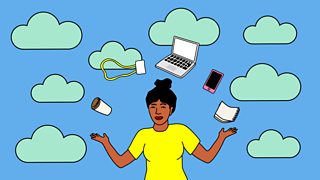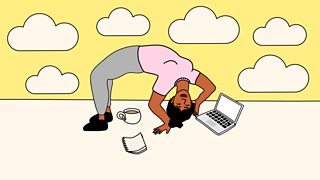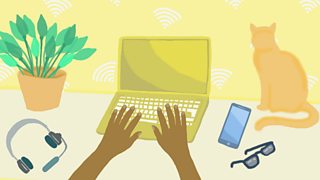The highs and lows of working from home
Since the lockdown began, millions of us have been toiling away trying to work from home for the first time: converting living rooms and bedrooms into makeshift office space, wrangling with technology, and juggling family life with working hours. How good are we at doing it? For In Business, Caroline Bayley explores the upsides and challenges of “WFH”.

Working from home is nothing new
Home working isn’t a new concept. With modern technology enabling those working in office-type, predominantly service industry jobs to do it more easily, it’s estimated that even before the coronavirus lockdown 15% of us were regularly working from home.
-
![]()
In Business: Working From Home
Millions of us are now working from home. But what are the upsides and challenges of working like this?
You might then presume that lockdown simply required a subtle shift from a desk in the office to one in the corner of the sitting room. But let’s face it, fulltime enforced “WFH” is a whole different kettle of fish.
It’s estimated that even before the coronavirus lockdown 15% of us were regularly working from home.
How well is this unplanned experiment actually going? Are there benefits?
And what are the challenges we’re facing in our millions?
Working from home can increase productivity
Nicholas Bloom, Professor of Economics at Stanford University, has devoted a considerable amount of time to researching the benefits of working from home.
Back in 2014, he ran a scientific experiment with , China’s largest travel agent. They asked 500 employees to work from home, and the results were surprising. “We found that people that worked from home for nine months were significantly more productive,” says Nicholas. “Their output went up 13%, which is huge – almost an extra day a week – and their quit rates halved.”
The reasons the volunteers gave for increased productivity were that it was quieter and they were less distracted.
They also didn’t have to deal with issues around commuting, turning up late or leaving early in order to collect a sick child (for example). They worked their entire shift and they were more efficient within it.
No face-to-face contact makes innovation and idea generation harder
Although productivity may be increased day to day, distance working is likely to have a negative impact in other ways in the long-term, suggests Nicholas.
Not getting together in the office means less brainstorming, bouncing ideas off each other and collective problem solving.
An expert’s tips for home-working
Dr Frances Holliss is an architect and academic who’s specialised in making working from home easier and more effective. Here are her top tips for getting in the right physical and mental space to “WFH”:
- If you’re sharing a workspace with a partner or housemate and need to take a work call, leave the room.
- Don’t interrupt each other’s work with domestic chit chat.
- Design a “journey to work” in order to consciously transition from home to “the office” each morning. This could be taking a long walk outside before opening your laptop.
- Dress to impress. Try having breakfast in your jeans and then changing into a suit for the move to your desk!
- Alter the space to get in a work mood: move furniture, roll out a rug and change the lighting.
“What’s being shelved would be longer run things around innovation, new ideas, training, reorganisation,” says the professor or Economics. The elements that drive longer term growth may fall by the wayside.

Is working from home really more efficient?
More of us are working from home, and nine out of ten who don't would like to.
Working from home can be a physical strain
Many of us have had to rig up makeshift workspaces. We’re sitting on kitchen rather than office chairs and our screens are stacked on books. On top of that, we’re all getting less outdoor time.

Stephen Bevan, head of HR research development at the , has been crunching the data from a sample of 500 homeworkers, surveyed in the first two weeks of the lockdown. There are already clear signs, he says, of physical strain. With lots of us hunching over laptops on kitchen tables, people are already experiencing pain.

How you can improve your posture to change your life
Standing in certain positions can transform your life, says Harvard professor Amy Cuddy.
Working alone has an impact on emotional wellbeing
The same survey shows that lockdown is proving challenging for some home workers when it comes to emotional wellbeing. “We’re finding an elevated risk of people suffering from mild to moderate mental health problems,” says Stephen.
Factors include reduced exercise, and feeling worried about finances or the health of another family member. One in five respondents said they felt lonely and isolated.
The CTrip experiment in China showed similar results. Although it was successful for the firm, between a half and two thirds of those who had been working from home were keen to get back to the office. “They said they were lonely, they were isolated, they got depressed,” says Nicholas Bloom.
With the Covid-19 crisis, not only are many of us being forced to work from home full-time, we’re also being denied the opportunity to socialise outside of office hours.

Open plan offices: are they good for you?
Open plan design is everywhere. But why?

For Arlia, a charity worker in her early thirties who lives alone, the novelty of those first couple of weeks has well and truly worn off and cabin fever has kicked in.
I will appreciate going to the office a lot more. I will appreciate making tea for my colleagues.Arlia, charity worker in her early thirties.
“I think working from home for such a long period of time without any social contact with friends and family is really exacerbating mental health issues,” she says. The experience has changed the way she feels about home working: “I will appreciate going to the office a lot more. I will appreciate making tea for my colleagues.”
Achieving any actual work can be challenging with kids in the picture
With schools and nurseries closed, many of us are having to juggle conference calls with childcare. Working “fulltime” may translate to as little as four or five hours a day if we’re in charge of the kids too.
-
![]()
Five tips for home schooling
Learning to home school can be overwhelming - here are five top tips.
Marie works in the fashion industry and has two children under the age of four. “It’s completely exhausting and you never see the end,” she says. Her and her husband have created a tag team, alternating work and childcare between them. Then after tackling bedtime together, it’s back to their work laptops until 11 or 12 at night. This set-up means she’s working very different hours to most members of the team she manages, who are young and child-free.
With schools and nurseries closed, many people are having to juggle conference calls with childcare. It can mean working very different hours to other team members who are child-free.
And although many employers are understanding of the situation parents find themselves in, this isn’t always the case.
Jane van Zyl from , a charity which supports parents and employers in encouraging flexible working, says that many employees are finding that their companies are not being accommodating in the way they would hope.

Businesses may be more open to flexible working in the future
Nicholas Bloom has experienced many of the above challenges first hand. (With two children at home who are learning to play the bagpipes, he’s looking forward to schools reopening.) But he still insists he’s a big advocate of home working – as long as “it’s two, three, four days a week, when you don’t have your children around, when you have your own room and you have proper equipment and broadband connections.”
Many bosses who used to say working from home wasn’t possible have had to find solutions.
The good news is that many bosses who used to say working from home wasn’t possible have had to find solutions. This massive global experiment has proved there are a wealth of things that we can easily do outside of the office. They may be more open to requests to work remotely in the future.
“The good side is companies will be much more willing to experiment with working from home,” says Nicholas. “All of that’s going to reduce congestion, reduce commute time and reduce environmental damage.”
For the most of us though, we’ve never been so eager to get back on that packed tube, train or bus and get back to work.
-
![]()
Want a flexible job? Here are four tips to negotiate your dream role
Is there a way to make a dream job work on your terms?
More from Radio 4
-
![]()
In Business: Working From Home
Millions of us are now working from home. But what are the upsides and challenges of working like this?
-
![]()
Don’t Tell Me The Score
Performance nutritionist James Collins has a wealth of tips to share.
-
![]()
Seven tips for staying happy and healthy during a lockdown
Dr Beth Healey specialises in advising on staying happy and healthy in isolation.
-
![]()
Working from home: Six tips for staying productive and calm
How do you successfully work from home right now whilst staying productive and calm?






